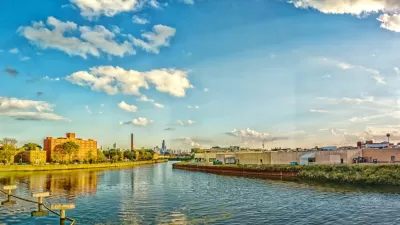Aaron M. Renn looks at Chicago's struggles over the last decade - one that saw the city "increasingly falling behind its large urban brethren" - and asks whether its aspirations for becoming a global city are delusional.
Following a decade that saw the city "experiencing a steep decline quite different from that of many other large cities," including rapid population decline and the highest percentage of job loses amongst the country's ten largest metro areas, Renn lays out the "host of challenges" for new mayor Rahm Emanuel.
According to Renn, the primary challenge may be one of unrealistic aspirations. "Many of Chicago's woes derive from the way it has thrown itself into being a 'global city' and the uncomfortable fact that its enthusiasm may be delusional."
"Chicago as a whole is less a global city than the unofficial capital of the Midwest, and its economy may still be more tied to that troubled region than it would like to admit. Like the Midwest generally, parts of Chicago suffer from a legacy of deindustrialization: blighted neighborhoods, few jobs, a lack of investment, and persistent poverty."
Renn concludes by suggesting how the city can begin to dig itself out of its current predicament: by focusing on areas such as tackling the city's fiscal crisis, improving the business climate, and changing the political culture.
"Fixing Chicago will be a big, difficult project, but it's necessary. The city's sparkling core may continue to shine, and magazines may continue to applaud the global city on Lake Michigan-but without a major change in direction, Chicago can expect to see still more people and jobs fleeing for more hospitable locales."
FULL STORY: The Second-Rate City?

Planetizen Federal Action Tracker
A weekly monitor of how Trump’s orders and actions are impacting planners and planning in America.

Map: Where Senate Republicans Want to Sell Your Public Lands
For public land advocates, the Senate Republicans’ proposal to sell millions of acres of public land in the West is “the biggest fight of their careers.”

Restaurant Patios Were a Pandemic Win — Why Were They so Hard to Keep?
Social distancing requirements and changes in travel patterns prompted cities to pilot new uses for street and sidewalk space. Then it got complicated.

Platform Pilsner: Vancouver Transit Agency Releases... a Beer?
TransLink will receive a portion of every sale of the four-pack.

Toronto Weighs Cheaper Transit, Parking Hikes for Major Events
Special event rates would take effect during large festivals, sports games and concerts to ‘discourage driving, manage congestion and free up space for transit.”

Berlin to Consider Car-Free Zone Larger Than Manhattan
The area bound by the 22-mile Ringbahn would still allow 12 uses of a private automobile per year per person, and several other exemptions.
Urban Design for Planners 1: Software Tools
This six-course series explores essential urban design concepts using open source software and equips planners with the tools they need to participate fully in the urban design process.
Planning for Universal Design
Learn the tools for implementing Universal Design in planning regulations.
Heyer Gruel & Associates PA
JM Goldson LLC
Custer County Colorado
City of Camden Redevelopment Agency
City of Astoria
Transportation Research & Education Center (TREC) at Portland State University
Camden Redevelopment Agency
City of Claremont
Municipality of Princeton (NJ)




























